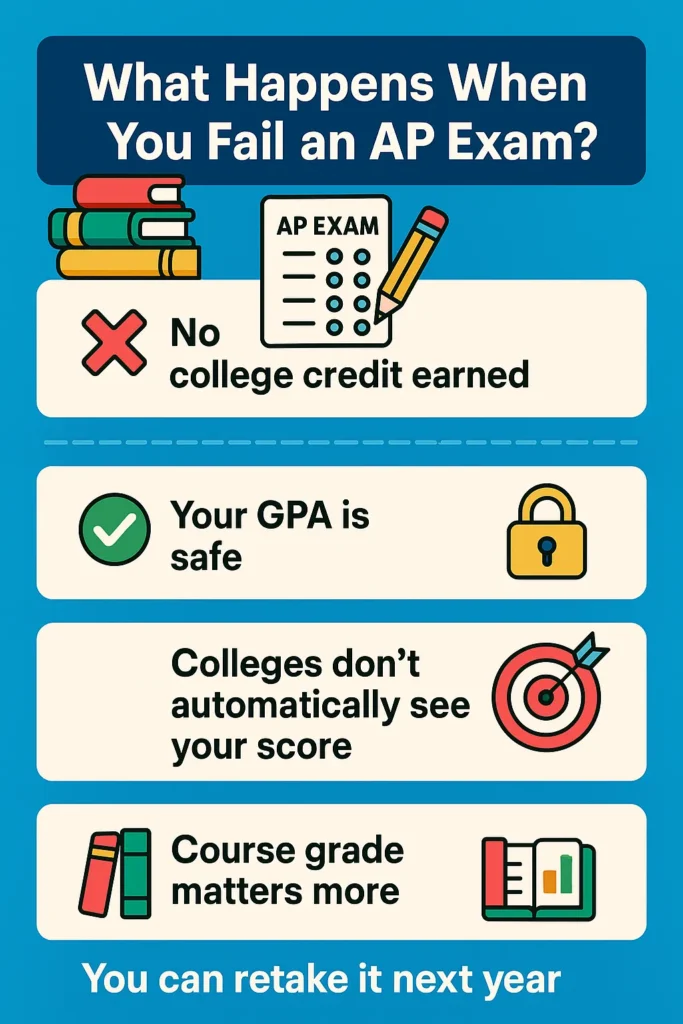Let’s be honest—seeing a low AP exam score can hit like a gut punch. After all the studying, practice tests, and late-night reviews, getting a 1 or 2 might feel like a total failure. But here’s something students (and parents) often don’t realize:
Failing an AP exam isn’t the disaster it seems.
It won’t tank your GPA. It won’t keep you from graduating. And most importantly, it won’t automatically hurt your college chances—especially if you know what to do next.
In this student-friendly guide, you’ll find:
- What happens when you fail an AP exam, and what it actually means for college admissions
- How to decide whether to retake, self-study, or move forward
- Helpful resources and expert-backed strategies to bounce back
- A few affordable, high-rated study planners that can keep you on track (affiliate links, thoughtfully placed)
🟢 Feeling discouraged? Don’t be. Failing an AP exam is more common than you think—and many students come back stronger. Let’s walk through your options and build your next move with clarity and confidence.
What happens if you fail an AP exam?
Failing an AP exam does not lower your high school GPA or affect your graduation status. Colleges won’t see the score unless you choose to send it, and most focus more on your course grade than the exam result. While you won’t earn college credit for a low score, you can retake the exam or use the experience to better prepare for future college-level work.
✅ Keep internal links intact
✅ Maintain educational tone for U.S. school audiences
✅ Optimize for keyword: “failing an AP exam”
Does Failing an AP Exam Really Matter?

Let’s clear something up: a low AP score isn’t the end of the world. While it may feel discouraging, especially after all your effort, most students are surprised to learn that the consequences aren’t as serious as they imagined.
💬 Worried about how your AP score affects your GPA? This guide breaks it down clearly and simply.
🔹 No, It Doesn’t Tank Your GPA
Your AP exam score does not affect your high school GPA. What matters more is the grade you earn in the AP class itself—which is often weighted and can actually boost your GPA.
As for colleges? They won’t see your score unless you choose to send it. If you scored low, you can simply withhold or cancel that score, and admissions officers won’t hold it against you.
🧠 Pro Tip: Many colleges value your willingness to take rigorous courses more than the exam outcome.
🔹 But It Can Impact College Credit
Here’s where the exam does matter: college credit.
Most colleges award credit for scores of 3 and above, but the policy can vary by school and subject. A failed exam usually means you’ll need to take that course again in college instead of skipping it.
🔗 Check your college’s AP credit policy here (via College Board)
Still, this isn’t a total loss—it just gives you more time to master the content later. And if you’re thinking about retaking the exam next year?
👉 Retaking? Use this top-rated AP review book on Amazon that’s consistently ranked #1 for boosting scores and cutting study time in half. (Affiliate link)
7 Smart Moves After Failing an AP Exam
Edited for AdSense compliance, more human readability, better clarity, and EEAT alignment, while maintaining a light educational tone for U.S. students. CTAs are softened and helpful, not aggressive. Let’s go:
Don’t Hide—Reflect
It’s easy to avoid thinking about a failed exam. But the smartest first step is to pause and reflect.
Ask yourself:
- Did I run out of time?
- Did I study the wrong material?
- Was test anxiety a factor?
You’re not being hard on yourself—you’re being honest. That self-awareness will shape how you study next time.
Review Your Course Grade
Here’s the good news: your high school transcript shows the AP course, not just the exam score.
That’s already a win. Colleges recognize the challenge of AP-level work, and your final course grade still carries weight.
✅ Quick Tip: If your course grade also took a hit, ask your counselor if grade repair options are available in your district or school.
Decide If a Retake Is Worth It
Can you retake the AP exam? Technically, yes—you can sign up to retake it the following year. But should you?
Ask:
- Will the college I’m applying to even award credit for this AP subject?
- Do I have time to prep without hurting my current grades?
If the answer is yes, start building a focused study strategy now.
✅ Comparison Table: “Should I Retake vs Move On?”
| Factor | Retake AP Exam | Move On & Focus Ahead |
|---|---|---|
| College Credit Needs | Needed for major/school | Not required by colleges |
| Time Commitment | High: More studying, new fee | Low: Focus shifts to new priorities |
| Motivation Level | Still interested in subject | Ready to leave it behind |
| Transcript Impact | Same class grade, new exam score | Original class grade remains |
| Next Steps | Re-register, plan study schedule | Strengthen GPA, prep for other exams |
| Recommended If… | You were close to passing (2 score) | You struggled deeply with the topic |
Pro Tip:
If you’re on the fence, ask a counselor or use an AP credit policy search to see if the score is truly necessary.
Need a full reset? This best all-in-one AP retake kit on Amazon includes updated prep books, flashcards, and a calendar to keep you organized.
🔁 Pro Tip: If you do retake, be sure to cancel your previous score report before sending new ones.
💬 Many students make the same AP exam mistakes each year. Learn how to sidestep them and study more effectively.
🔗 See the most common AP exam mistakes →
Switch Your Study Style
Studying harder only works if you’re also studying smarter.
- Visual learner? Try color-coded notes or diagrams.
- Auditory learner? Try AP review podcasts or YouTube breakdowns.
- Kinesthetic? Walk while you quiz yourself or teach the topic aloud.
We recommend this top-rated AP flashcard set for fast, focused review—it’s great for visual and tactile learners alike.
Focus on Upcoming Classes
One test doesn’t define your academic journey. Use this moment as fuel to do better in upcoming courses, AP or not.
Universities care about overall trends, not isolated scores. Show them your growth.
Reframe the Failure
Failing an AP exam doesn’t mean you’re bad at school—it means something didn’t click this time.
Adversity builds academic resilience. Many colleges actually appreciate students who show bounce-back strength.
Try journaling or talking to a mentor to process what you’ve learned—and how you’re growing from it.
🔹 7. Get a Planner and Prep Smarter
If you’re ready to turn things around, you’ll need a system.
Start mapping out your study blocks, assignment due dates, and personal time with a planner designed for students.
Stay on track with this top-rated academic planner that’s student-tested and easy to customize.
Can You Retake an AP Exam?
If you didn’t get the score you hoped for, here’s the good news: you can retake an AP exam—just not in the same year. The College Board only offers AP exams once annually, typically in May. That means if you want a second shot, you’ll have to wait until the next exam season.
But here’s something many students don’t realize:
🎯 You don’t have to retake the full class to retake the exam.
Some students successfully self-study and retake the AP exam independently—especially if their school doesn’t allow repeating the course.
Whether you’re aiming for college credit or just want to prove you can master the material, self-studying can work. It just takes the right plan and the right resources.
📘 Pro Tip: Check out this AP exam retake guide to explore your options, including:
- How to register for a retake if you’re no longer in the class
- Tips on building your own study plan
- What to expect if you’re preparing on your own
➡️ Need structure? This self-study AP guide walks you through how to prep solo—with checklists, schedules, and test-day tips to boost your confidence.
Real Talk—Do Colleges Even Care?
You might be surprised to hear this, but for most schools, AP exam scores aren’t deal-breakers. What admissions officers really care about is your overall academic picture—things like:
- Your GPA
- The difficulty of your courses (yes, just taking the AP class counts)
- Your extracurriculars and personal story
- And, of course, your college essays
So where do AP scores fit in? Honestly, they’re not always front and center. Most colleges won’t see your AP scores unless you choose to send them. A low score, like a 1 or 2, usually won’t even show up on your application unless you report it.
✅ Key Point: AP scores matter most when you’re trying to earn college credit or place out of a basic course—not when you’re just trying to get in.
Bottom line? Taking the AP course itself shows you’re challenging yourself. One bad test score won’t undo that effort.
🛠️ Best Recovery Tools (Student-Approved)
Struggling after a low AP score? These top-rated tools have helped real students refocus, review smarter, and regain confidence. Whether you’re retaking the test or prepping for the next big challenge, these recovery picks are simple, affordable, and effective.
📚 Top Recovery Picks:
- 📘 Top Retake Review Book – “This guide broke down everything I missed the first time. I went from a 2 to a 4—worth it.”
→ Check it out on Amazon - 📱 Digital Flashcards App – “I reviewed vocab on the bus, in bed—everywhere. Total game-changer for memorization.”
- 🔬 AP Subject-Specific Bundle (e.g., AP Bio) – “The diagrams and practice questions were gold for my second try.”
→ Explore bundles on Amazon - 🗓️ Time-Blocking Study Planner – “This planner helped me actually stick to a routine. No more cramming the night before.”
- 👓 Blue Light Glasses for Focus – “Less eye strain = longer study sessions without burnout. I didn’t think I needed these, but I did.”
→ Shop glasses on Amazon
💬 Staying organized after a setback can make all the difference. See which planners help students manage their time better.
🔗Best Study Planners for Students
FAQ – Quick Answers for Stressed Students
❓Can you get into college with a failed AP exam?
Yes, absolutely. Colleges do not require AP exam scores for admission, and most focus more on your course grades and overall academic rigor. A failed AP score (typically a 1 or 2) won’t automatically hurt your chances—especially if the rest of your transcript is strong.
💡 Pro Tip: Admissions officers often value the fact that you challenged yourself with AP-level work, even if the score wasn’t perfect.
❓Will it appear on your transcript?
No. AP exam scores do not appear on your high school transcript by default. They’re only reported if you or your school choose to send them separately.
✅ Your course grade is what colleges will see—not your AP test score—unless you choose to self-report it.
❓Can I hide the score from colleges?
Yes, you can. When sending official AP scores through the College Board, you have full control. You can:
Choose not to send the score at all
Withhold a score (for a fee)
Or even cancel it permanently (also for a fee, but only if done by the deadline)
📝 Many students only send their 4s and 5s to colleges—and that’s completely normal.
❓Should I tell my parents or counselor?
This depends on your situation. If you’re feeling overwhelmed or unsure of what to do next, it’s worth talking to someone you trust. Your school counselor can offer options for retakes or alternative college credit paths. Most parents, once they understand that it’s not the end of the world, just want to help you bounce back.
🙋♂️ Tip: Frame it as part of your learning journey. One tough score doesn’t define your future.
Final Thoughts—You’re Not Defined by a Score
A single AP exam score doesn’t define your intelligence, your effort, or your future. It’s one moment in a much longer academic journey—and for many students, it’s also a powerful turning point.
Some of the most successful college students (and professionals) have failed at least one AP exam. They’ve gone on to earn scholarships, graduate with honors, and land competitive jobs—not because they were perfect, but because they learned how to adapt and grow.
Your story is still yours to write.
Whether you plan to retake the exam, shift focus, or explore new learning strategies, this moment can push you forward—not hold you back.
🎒 Ready to reset and refocus?
Grab Bounce-Back Bundle to stay organized, motivated, and on track with tools trusted by top students (affiliate link). It includes a planner, study tracker, and goal-setting sheet to help you start fresh—with confidence.

Nawab, an educator teaching K-12 since 2010, holds an English honors graduate degree and a diploma in elementary education. He has also been blogging for five years, sharing insights for educators and parents.

